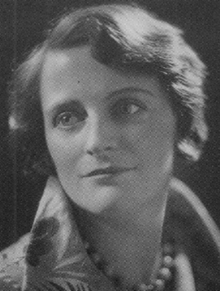Betty Joel
Betty Joel (née Mary Stewart Lockhart; 7 June 1894, Hong Kong – 21 January 1985, Hampshire) was a British furniture, textile and interior designer, active in England from c. 1921 until 1937.[1] Her work was featured in The Studio, the illustrated fine arts and decorative arts magazine, from 1927 to 1937. Examples of her work can be seen in the Victoria & Albert Museum, London and the Geffrye Museum, London.

Early life
The daughter of James Stewart Lockhart, KCMG, LLD (1858–1937) and Edith Louise Rider (née Hancock) (1870–1950), Joel who was called by the name Betty from a young age, was born in Hong Kong, where her father was an administrator.[2] She met her future husband, David Joel (1891–1973), a naval officer in Ceylon, returning to England together after the end of the First World War.
Career
I personally began to design furniture because I despaired of trying to adapt old furniture to the needs of my own entirely modern house.[3]
Without any formal training, she started her own business Betty Joel Ltd. with her husband David Joel, with a furniture workshop, initially located on Hayling Island and retailing through her shop in Sloane Street. She began to design furniture, using the expertise of the local craftsmen from around local area who had previously worked as yacht fitters[2] and specialized the traditional boat building woods, oak and teak.
The designs were first retailed through their showroom in London at 177 Sloane Street and then at 25 Knightsbridge. The larger premises allowed them to show a wider range of items and to hold art exhibitions. Exhibitions included rugs by Ivan da Silva Bruhns,[4][5] the French artist, drawings by Matisse and paintings by Marie Laurencin.
She began to design her own rugs which she had made in Tianjin, China and textiles which were manufactured in France. Her work in both furniture and textiles was distinctive for the use of curved lines and curvilinear shapes.[6]
In 1938 she created a study for Lord Mountbatten's Park Lane, London home[7] and a bedroom for the 2nd Countess of Iveagh at Elveden Hall. Other commissions included work for the Savoy and the St James's Palace Hotel, and for the then Duchess of York.[8]
With the breakdown of their marriage in 1939,[9] Betty retired from the design business and did not work again.[6] David Joel continued the business renaming it David Joel Ltd.
Exhibitions
- London: Royal Academy of Arts (1935), Exhibition of British Art in Industry[10]
- New York: Metropolitan Museum of Art (1937), Rugs and carpets: An International Exhibition of Contemporary Industrial Art[11]
- Brighton: Royal Pavilion, Art Gallery & Museums (1975) British Carpets and Designs: The Modernist Rug 1928-1938 cat no 8
References
- Seddon, Jill. "Oxford DNB article: Joel, Betty". www.oxforddnb.com. Retrieved 13 August 2016.
- Anscombe, Isabelle (1985). A woman's touch : women in design from 1860 to the present day. Harmondsworth, Middlesex, England: Penguin Books. p. 169. ISBN 0140081003.
- Patmore, Derek (1932). "British Interior Architects of To-Day. 6. Betty Joel". The Studio. 104: 276.
- Sherrill, Sarah B. (1996). Carpets and rugs of Europe and America (1st ed.). New York: Abbeville Press. p. 365. ISBN 1558593837.
- Furst, Herbert (1930). "Da Silva Bruhns' Carpets and Rugs at the Betty Joel Galleries, Hyde Park". Apollo. XI (May, No 65): 397–8.
- Wilk, Christopher (1995). "Who was Betty Joel? British furniture design between the wars". Apollo. 142: 7–11.
- Bayer, Patricia (1998). Art deco interiors : decoration and design classics of the 1920s and 1930s (Publ. in pbk. ed.). New York [u.a.]: Thames and Hudson. p. 124. ISBN 0500280207.
- Banham, Joanna ed (1997). Encyclopedia of interior design. London: Fitzroy Dearborn. pp. 658–9. ISBN 9781884964190.CS1 maint: extra text: authors list (link)
- "Betty Joel". www.oxforddnb.com. Retrieved 22 September 2016.
- "Exhibition of British Art in Industry". www.racollection.org.uk. Retrieved 13 August 2016.
- "Rugs and carpets : an international exhibition of contemporary industrial art at the Metropolitan Museum of Art, 1937, 1937 : Metropolitan Museum of Art Publications". libmma.contentdm.oclc.org. p. 15. Retrieved 13 August 2016.
Further reading
- Foulk, Raymond; Lewis, Jenny (1996). Betty Joel: Celtic Spirit from the Orient. Foulk Lewis Collection. ISBN 0952991527.
- Joel, David (1969). Furniture Design Set Free. The British furniture revolution, 1851 to the Present Day. London: JM Dent and Sons Ltd.
External links
- "Betty Joel in the V&A Collections".
- "Betty Joel in the Geffrye Museum Collection". www.geffrye-museum.org.uk. Retrieved 16 August 2016.
- Foulk, Ray. "Betty Joel from Arts & Crafts to Modernism". www.millineryworks.co.uk. Exhibition 2007. Archived from the original on 29 April 2012. Retrieved 13 August 2016.
- Portrait "Betty Joel (née Mary Stewart Lockhart) – National Portrait Gallery". The National Portrait Gallery. Retrieved 15 August 2016.